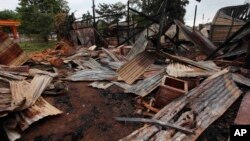The United States is condemning a fresh round of deadly attacks against minority Muslims in western Burma and urging authorities to do more to address the long-standing sectarian tension there.
The U.S. Embassy in Rangoon's statement on Wednesday followed several days of violence that has killed at least five Muslims, including a 94-year-old woman, in Rakhine State.
Residents said several Buddhist mobs armed with sticks and knives went on a rampage in the town of Thandwe earlier this week, burning down homes and attacking Muslim-owned establishments.
President Thein Sein toured strife-torn areas of Rakhine and met with local leaders for a second day Wednesday. It was his first trip to the troubled state since a wave of anti-Muslim violence broke out in June 2012, killing dozens and displacing tens of thousands.
In remarks carried in state media Wednesday, the president said "such instability based on religion and race harms and delays" Burma's recent democratic reforms and "tarnishes the national image."
Rights groups have accused Burmese police and military personnel of not doing enough to stop the violence. In some cases, witnesses have reported that authorities have joined in the attacks.
The U.S. Embassy statement strongly urged the Burmese government to "respond quickly and decisively" in protecting residents and holding accountable those responsible for the violence.
It also said Burma must "do more to ensure progress in security, rule of law, justice, humanitarian access, and reconciliation in Rakhine State.
Sectarian clashes have killed at least 240 people since they erupted in Rakhine in June 2012 and later spread to other parts of Burma. Most of the killings have happened in Rakhine, home to several Muslim minorities, including stateless Rohingyas.
The U.S. Embassy in Rangoon's statement on Wednesday followed several days of violence that has killed at least five Muslims, including a 94-year-old woman, in Rakhine State.
Residents said several Buddhist mobs armed with sticks and knives went on a rampage in the town of Thandwe earlier this week, burning down homes and attacking Muslim-owned establishments.
President Thein Sein toured strife-torn areas of Rakhine and met with local leaders for a second day Wednesday. It was his first trip to the troubled state since a wave of anti-Muslim violence broke out in June 2012, killing dozens and displacing tens of thousands.
In remarks carried in state media Wednesday, the president said "such instability based on religion and race harms and delays" Burma's recent democratic reforms and "tarnishes the national image."
Rights groups have accused Burmese police and military personnel of not doing enough to stop the violence. In some cases, witnesses have reported that authorities have joined in the attacks.
The U.S. Embassy statement strongly urged the Burmese government to "respond quickly and decisively" in protecting residents and holding accountable those responsible for the violence.
It also said Burma must "do more to ensure progress in security, rule of law, justice, humanitarian access, and reconciliation in Rakhine State.
Sectarian clashes have killed at least 240 people since they erupted in Rakhine in June 2012 and later spread to other parts of Burma. Most of the killings have happened in Rakhine, home to several Muslim minorities, including stateless Rohingyas.






